How long does it take to potty train a puppy?
It takes three or four weeks to potty train most puppies, but …
It depends!
There’s no magic age or amount of time, but people generally set their expectations too high. Potty training a puppy takes longer than some puppy owners realize.
It depends on the puppy and the consistency of the person.
With my weimaraner puppy, it took about 6 weeks for the potty training to “click.”
I got him when he was 8 weeks old and once he was 14 weeks I realized he hadn’t had an accident in a long time. He definitely was not 100 percent potty trained yet. But close.
Six weeks may seem fast but during that time I kept thinking, when will my puppy “get it”? It got really old taking him out 12 or 13 times a day, but it paid off.
It takes 2 or more weeks to potty train a puppy
I get a lot of emails that say things like:
“I just got a puppy and I’ve been taking her out every 2 hours but she still goes potty in the house. She just isn’t getting it!”
And when I ask how long they’ve had the puppy, it’s usually a short time like 3 or 4 days or maybe two weeks at the most!
It takes at least two weeks to fully potty train a puppy. Most puppies will need 4 to 8 weeks or even longer.
It’s very simple to potty train a puppy, but that doesn’t mean it’s easy. It’s hard work. I had to take Remy out literally 13 times a day. Every day. For several weeks.
Some puppies are easier to potty train than others
Here are some reasons why potty training my Weimaraner puppy was pretty easy:
1. Weimaraners seem pretty easy to potty train because they’re smart! Some breeds may be more challenging. Just be consistent.
2. Larger breeds in general seem fairly easy to potty train. This might be because their owners are more consistent or maybe they can hold it longer.
3. I worked from home and had a flexible schedule. I took Remy out every hour. Not everyone can do that.
So you see, it took me 6 weeks to potty train my puppy, but I had the luxury of a flexible schedule.
If it’s taking your puppy a little longer, don’t worry. That’s OK! It’s not fair to compare your puppy to others. Just stick to your routine and he will get it with time.
*If you just got a new puppy, download my free puppy training guide. Click Here
Puppy Potty Training Methods
To keep it simple, all you really need to do to potty train your puppy is:
- take your puppy out often, like every hour.
- crate/kennel him whenever you can’t supervise.
- do NOT expect your puppy to “tell you” he needs to go! Just take him out (for now).
Other puppy potty training tips
1. Take your puppy to the same spot every time. Head through the same door every time to get there. You’re creating a habit/routine.
2. Head out the same door every time. And take the same route to the potty area. Remember, you’re creating a habit.
3. Give a highly valued treat immediately. Do this right after he goes. Don’t wait until you’re back inside. I recommend the soft Wellness Well Bites.
4. Carry him out if he’s having accidents on the way. I carried Remy out every time for about three weeks or more.
5. Crate/kennel your puppy when you can’t supervise. This is so your puppy does not wander off and have accidents.
Most will not go potty in their kennels. When you’re home with your puppy, keep him in the same room as you so you can supervise and prevent accidents.
6. Ignore accidents unless you catch him in the act. If you catch your puppy going potty or poop in the house, calmly say “no” and carry him out to the correct spot. Reward him there! Yay! Good boy!
If you discover an accident after the fact, just calmly clean it up. If you scold your puppy at this point, he won’t understand the connection.
Your puppy will catch on as long as you are patient and consistent.
It does get easier.
8 week old puppy potty training schedule
Here is a sample potty training schedule for an 8 week old puppy.
5:30 a.m.: Rise and shine, first potty break! Carry your puppy right outside.
5:45 a.m.: Head back out again right after the puppy eats breakfast. If the puppy doesn’t go potty, then head out again in 30 minutes.
Throughout the morning: Plan a potty break every 60 minutes or so. If you have to head to work or to run errands, then place your puppy in a crate or in a small, gated off section of your house such as a kitchen or bathroom. Try not to leave your puppy for more than 4 hours, if possible.
Noon: Puppy lunch time! Many puppies do best with three meals per day. Then, potty break time!
Throughout the afternoon: Potty break every 60 minutes or so. If you have to go back to work, then crate or confine your puppy to a small area. Try to limit this time to 4 hours at the most.
5:30 p.m.: Puppy gets dinner! Then another potty break!
Evenings: Continue potty breaks every 60 minute or so until puppy bed time.
10:30 p.m.: Nighty night!
2 a.m.: Optional potty break – Many puppies will not need this but some do for the first two weeks.
Tip: Use a notebook to write down every time you take your puppy out to go potty. This will help you get on a routine.
*If you just got a new puppy, download my free puppy training guide. Click Here
How long can a puppy hold it?
This is very general information. It’s better to take your puppy out more frequently than to guess how long he can hold it.
Puppies can approximately hold it for their age in months +1.
- A 2-month old puppy can hold it for 3 hours.
- A 3-month old puppy can hold it for 4 hours.
However, we shouldn’t ask puppies or adult dogs to hold it for any longer than 6 hours. And as you know by now, most puppies will need to go potty after they wake up for a nap and after they eat, regardless of time.
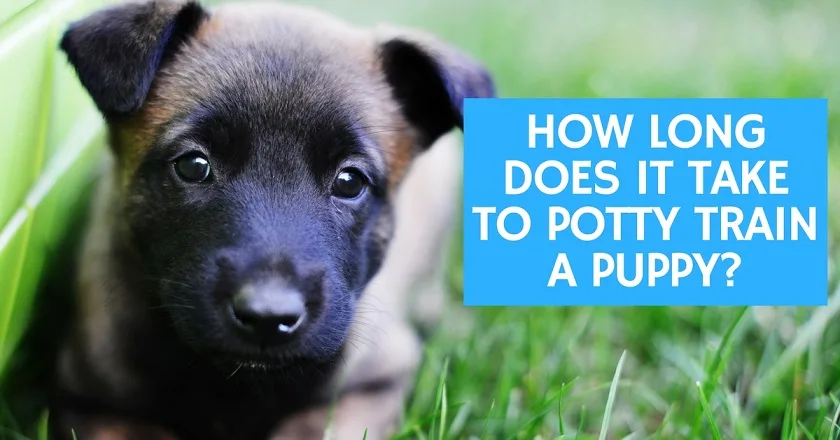
Working long hours when you have a puppy
It could be that you have no choice and have to work long hours. Meanwhile, your puppy is not able to get out for frequent enough potty breaks.
If that’s the case, a support system will be helpful to start your puppy’s potty training out on the right paw. You could ask friends or family to help out during the first few months.
Or, hire a professional dog walker or pet sitter to give the puppy several daily bathroom breaks.
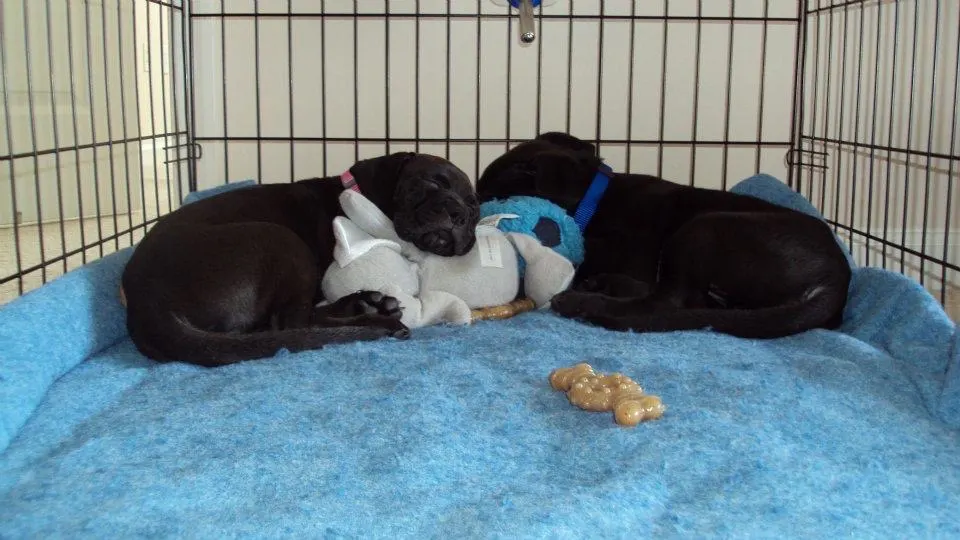
Puppy potty training mistakes
The following training mistakes are common and should be avoided:
1. Not being consistent. Consistency is the most important element in any dog training, including house training.
2. Waiting too long to take the puppy out. It’s up to us to know when our puppy has to go. Remember, that’s after every meal, nap and play session.
We’re all guilty of being lazy, tired or busy, but just keep the eye on the prize of having a house trained dog!
3. Scolding too firmly and scaring the puppy. Puppies are very impressionable during their first few months and don’t take well to being yelled at. It’s best to be assertive, but in a calm way.
4. Bad timing when handing out the reward. Reward the puppy at the correct time. If you give the reward too late or too early, the puppy will not make the connection.
5. Scolding hours after an accident happens. Unless you catch your puppy in the act of peeing or pooping inside right in front of your eyes, there’s absolutely no point in scolding him hours later. Dogs simply don’t think like that and won’t be able to make the connection.
More potty training mistakes
6. Not using a crate or confining at all. Puppies are easily overwhelmed by too much initial freedom. Use a crate or playpen when you can’t supervise your puppy.
Even when you can supervise, it’s a good idea to limit your puppy’s access to certain rooms. Keep most doors shut to decrease the likelihood of setting your puppy up for a potty break failure.
7. Assuming the puppy “gets it” when he doesn’t. We all think we have the smartest little puppy! But, we often expect too much from them too quickly.
8. Rubbing the puppy’s nose in the poop. There’s no point in doing this as all it does is create confusion. Your puppy will never in a million years understand that you’re rubbing his nose in his poop because you didn’t want him to poop in that spot.
Instead, calmly clean it up and take your puppy to an acceptable potty area.
9. Hitting the puppy. Even if it doesn’t hurt or you’re using a soft newspaper, hitting your dog will only make him fear you. Instead, you want to create a bond with him based on trust.
10. Using pee pads and assuming the puppy knows to use them. No dog is going to instinctively know what a training pad is and that you want him to pee on it.
Read on for my take on potty pads and how to teach your puppy to use them!
Potty training a stubborn puppy
Some puppies might come across as “stubborn” because they keep having accidents in the house.
However, most likely the puppy just doesn’t understand what’s expected of him. Be patient and make sure you’re being very consistent in your routine, taking your puppy out to the correct spot frequently.
Evaluate the situation and set up very clear structures:
1. Are you taking the puppy out immediately after meals, naps and playtime?
2. Create set mealtimes rather than free-feeding your puppy. That way it’ll be a lot easier to gauge when your puppy needs to use the bathroom.
3. Reward your puppy with verbal praise and a tasty, high-value treat every single time he goes potty outside. He’ll soon make the connection between using the bathroom outside and getting a food reward.
4. Could his crate be too large? Keep him crated in the right sized crate that’s not too large. You can either upgrade crates in size as your puppy grows. Or you can invest in a larger one and use a divider.
Dogs don’t want to spoil their sleeping area. If they’re staying in a crate that’s too large, they might turn one side into their sleeping area, and the other one into their bathroom.
5. If you catch your puppy in the act of going potty inside, calmly pick him up and take him outside to your preferred potty area instead. This will teach him the right spot to go potty in.
How to potty train a puppy on pads
Puppy potty pads can be a helpful tool when potty training a puppy if they’re used correctly.
However, they can also make us lazy and can have the opposite training effect.
We generally do not recommend puppy pee pads but we’re sharing about them because we know many people choose to use them regardless of our opinion.
Let’s take a quick look at the pros and cons of puppy pads:
Pros of puppy pee pads
- Can be a practical potty area when the puppy has to stay home alone without bathroom breaks.
- Potty pads can save your expensive carpet or wood floors from urine stains.
- They can come in handy when it’s pouring and your puppy refuses to go outside.
- The pads come in various sizes.
Tip: Potty pads can also be a good option for older dogs who are incontinent or those who’ve had surgery and have a hard time walking. Older dogs, especially house trained ones, will need to be trained to use the pads. So it would be a good idea to start training before a surgery for example.
Cons of puppy pee pads
- They’re expensive if used frequently. They’re not too bad. On Amazon, you can get a 100-pack for $30 but it adds up over time.
- Can be counter-productive and teach the puppy that it’s ok to go potty in the house.
- The puppy might never become truly housebroken.
- They’re not environmentally friendly.
- Puppies can track their pee from the pad onto their surrounding area.
- If the puppy is bored, he might play with the pad, chew it up or even eat it.
Tips to potty train a puppy on pee pads
- Create an area that’s lined with several potty pads, for example the inside of a playpen.
- Stick with this area to get your puppy used to their designated indoor potty area.
- Place the puppy on that area several times per day when you suspect that he has to go.
- Reward him with verbal praise (Yay, good boy!) and a high value treat when he potties on the pad area.
- Gradually reduce the amount of potty pads you put down to condition your puppy to use the bathroom only on the pad.
See That Mutt’s article How to train your dog to use pee pads or grass pads for more helpful tips on this topic!
How often do puppies poop?
Puppies eat a lot more frequently than adult dogs and will usually have 3-4 meals a day during their first 4 months. This means that they’ll also be pooping more frequently than adult dogs.
Puppies usually need to poop fairly quickly after they’ve eaten, so they’ll likely be needing to poop at least 4 times per day during their first 4 months. Lucky you!
How long does it take to potty train a boxer puppy?
Barbara lived in a third floor apartment when she adopted her 8 week old boxer mixes, Missy and Buzz.
They were potty trained after about 8 weeks. They were 4 months old at this time.
At first, Barbara had to carry the puppies downstairs and out to the potty area so they wouldn’t have accidents along the way!
She had a flexible schedule and took the puppies outside about every 2 hours for their first month. She also gave them a potty break in the middle of the night, as well as after every nap, meal and playtime session.
How long does it take to potty train a Lab puppy?
On average, it takes most Lab puppies about 6 weeks to be fully potty trained.
Lindsay will be getting an 8 week old Lab puppy in July 2021. She will report back on how long it takes to potty train her Lab puppy! She assumes it will take about 6 weeks like it did with her weimaraner puppy.
Update from Lindsay: We got our Lab puppy! He is 11 weeks old now and we head out for potty breaks about every hour when he’s awake. He’s definitely not potty trained yet. It’s been almost 4 weeks.
How to potty train an adult dog
Much of our puppy potty training advice holds true for house training older dogs as well.
Consistency and patience are certainly the most important components, but it also works in our favor that older dogs already have fully developed bladders.
That means that they can usually hold it longer than puppies and won’t need quite as many potty breaks.
While puppies do have to pee on a very regular basis, older dogs may be more likely to “mark.” Barbara experienced this when she started fostering a 1.5 year old dog who was house trained.
However, Wally was stressed out in his new environment and expressed this by marking the back of a couch.
How to stop a dog from marking in the house
- Wally was leashed inside the house for the first 10 days and was always in the same room as she was.
- He wore a belly band. It’s essentially a diaper for male dogs.
- When Barbara couldn’t actively supervise him, Wally was crated.
- When Wally went for potty breaks outside, he got rewarded with praise and tasty treats.
Once Wally was comfortable in his new home, the marking stopped. It also helped that he got to go on several structured daily walks where he got the opportunity to pee and poop.
Wally needed to get used to a new routine, and that’s the case for any dog regardless of age who starts living with a new owner.
Barbara later adopted him and experienced the marking one more time, about a year later.
That’s when she was in a new relationship and Wally felt jealous of her boyfriend, so he started marking one particular wall right outside of her bedroom. The belly band came out again and that fixed the problem.
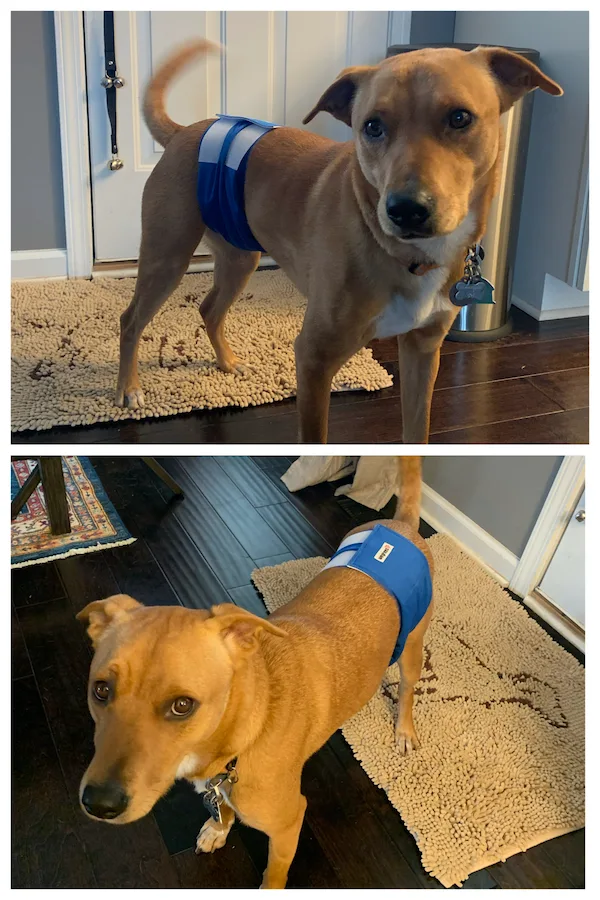
See That Mutt’s article How to potty train an adult dog for more information on this topic.
How long did it take your puppy or dog to become fully potty trained?
Let us know in the comments!
*If you just got a new puppy, download my free puppy training guide. Click Here
Related posts:
- Stop a dog from marking in the house
- How to potty train an adult dog
- How to train a puppy to use pee pads
- My puppy is going potty in her kennel
Barbara Rivers contributed to this article. She writes regularly for That Mutt and is a blogger, raw feeder and former dog walker. She maintains the blog K9s Over Coffee.
Lindsay Stordahl is the founder of That Mutt. She writes about dog training, dog exercise and feeding a healthy raw diet.

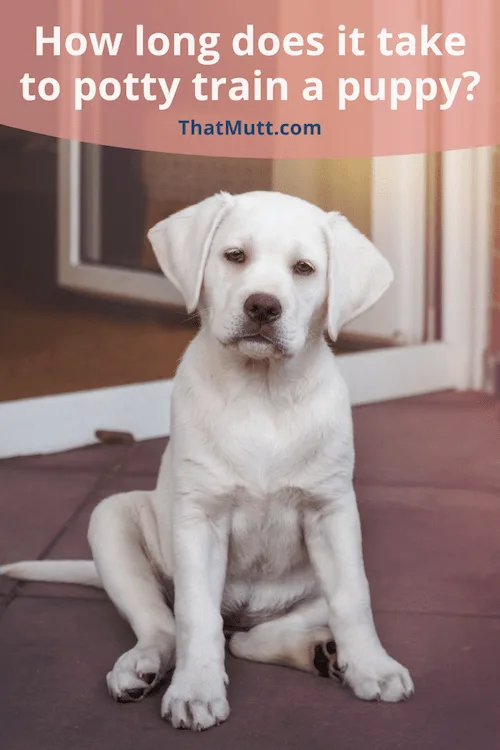
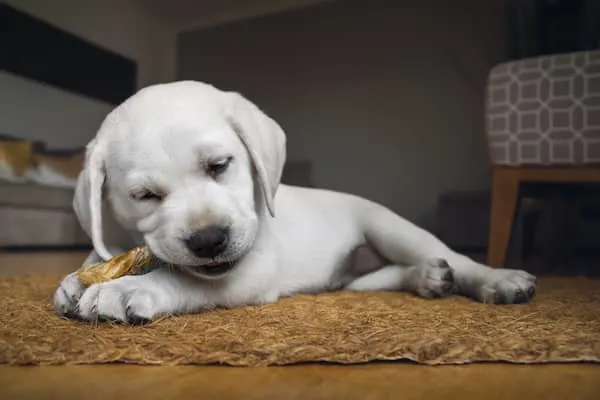
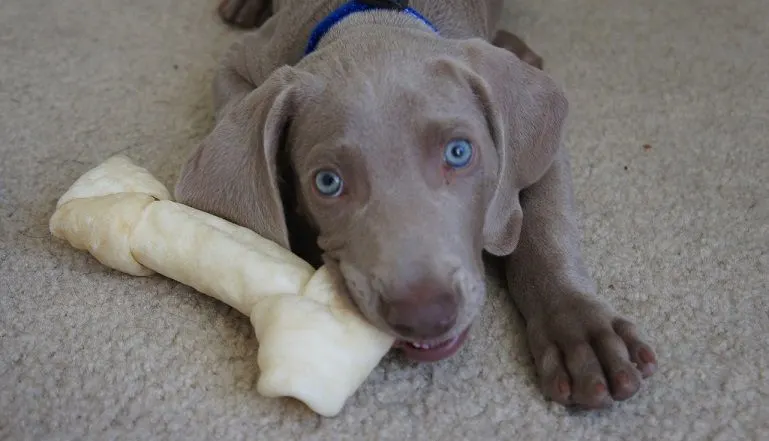
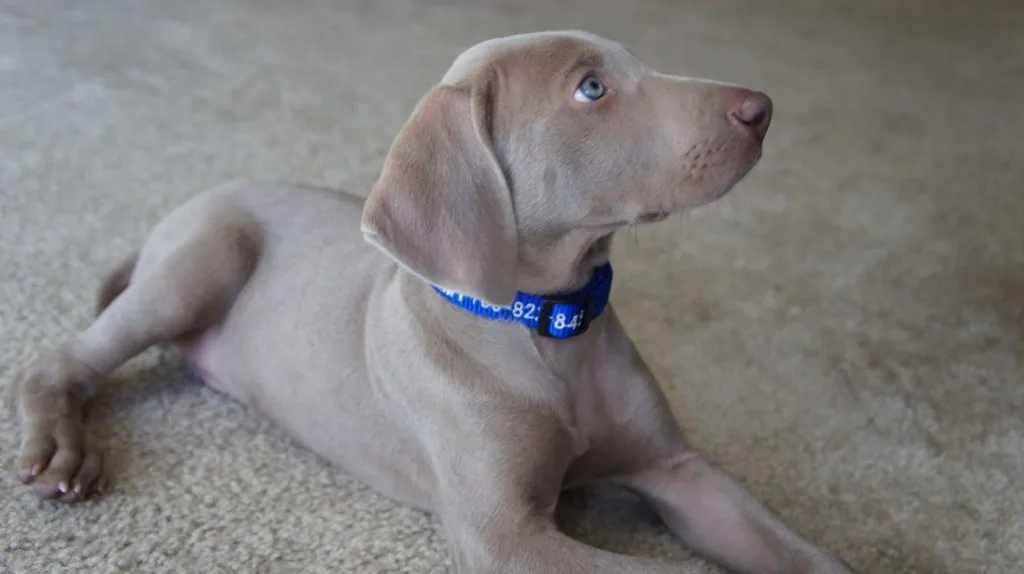
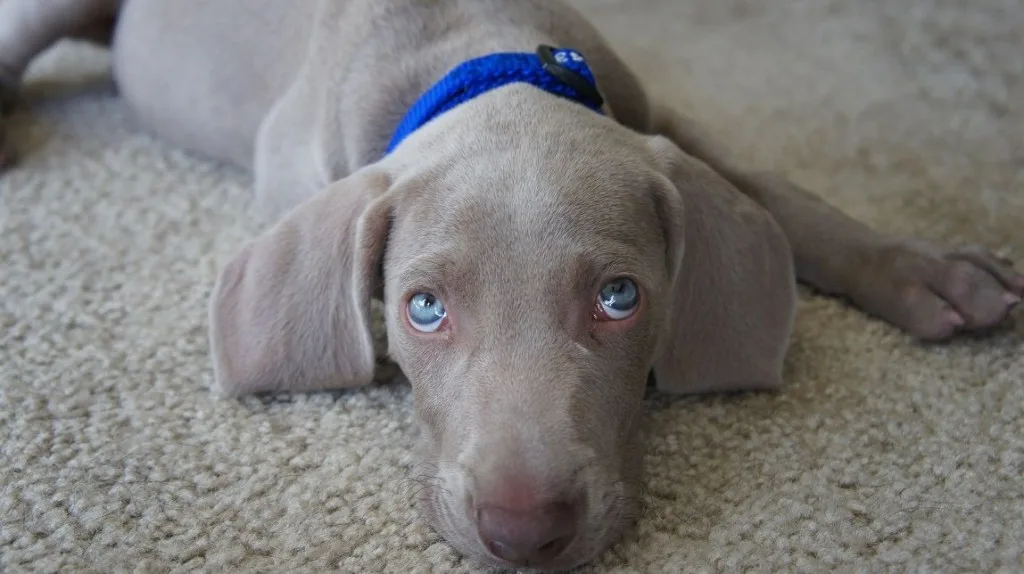
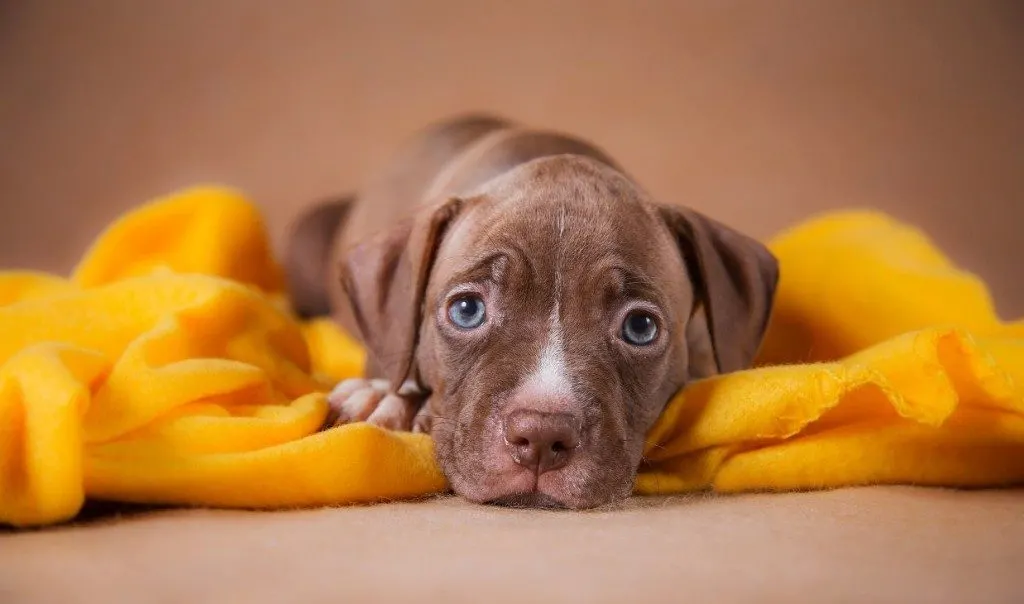
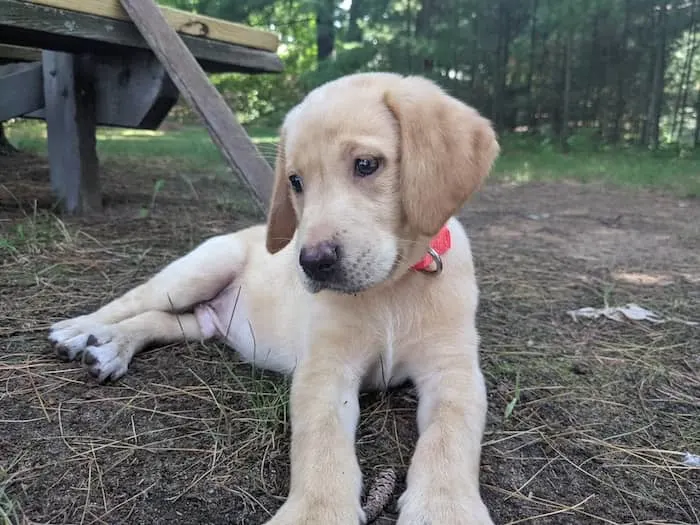
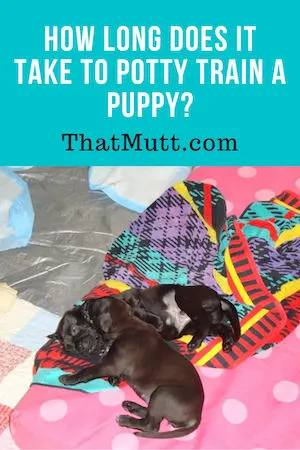
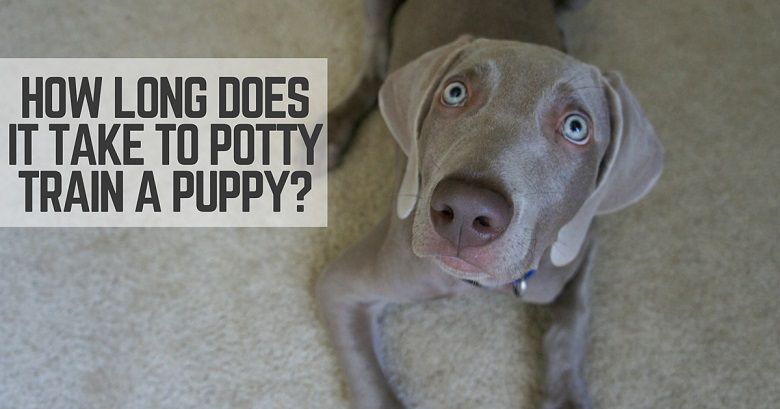
Why Is My Dog Peeing on the Bed? – What to Do? | Pets Enthusiast
Tuesday 1st of August 2023
[…] The first thing to ask yourself, especially if you have a puppy, young dog or newly adopted dog is, “Is my dog truly potty trained?” […]
Should You Get a Puppy While Pregnant? -
Thursday 23rd of February 2023
[…] example, I got up in the middle of the night to take my puppy outside for a potty break every night. I did that for about 6 […]
Is Board and Train Worth it? | VirarNews: Latest Virar News and Updates at Virality.bid
Wednesday 15th of February 2023
[…] months. So much of a puppy’s “training” in those first few months is really socialization, potty training and getting into a […]
Should You Get a Puppy While Pregnant? - Dog Blog
Tuesday 7th of February 2023
[…] example, I got up in the middle of the night to take my puppy outside for a potty break every night. I did that for about 6 […]
Is Board and Train Worth it? - NimasPark
Wednesday 1st of February 2023
[…] months. So much of a puppy’s “training” in those first few months is really socialization, potty training and getting into a […]